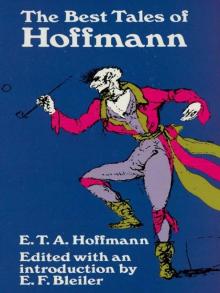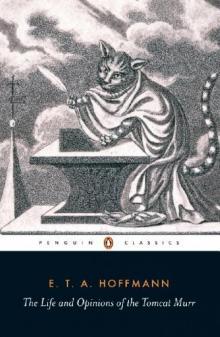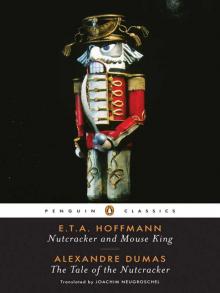- Home
- E. T. A. Hoffmann
The Best Tales of Hoffmann Page 11
The Best Tales of Hoffmann Read online
Page 11
“The Salamander heeded not the warning of the Spirit-prince: full of longing ardour he folded the green snake in his arms; she crumbled into ashes; a winged being, born from her dust, soared away through the sky. Then the madness of desperation caught the Salamander; and he ran through the garden, dashing forth fire and flames; and wasted it in his wild fury, till its fairest flowers and blossoms hung down, blackened and scathed; and their lamentation filled the air. The indignant Prince of the Spirits, in his wrath, laid hold of the Salamander, and said: ‘Your fire has burnt out, your flames are extinguished, your rays darkened: sink down to the Spirits of the Earth; let them mock and jeer you, and keep you captive, till the Fire-elements shall again kindle, and beam up with you as with a new being from the Earth.’ The poor Salamander sank down extinguished: but now the testy old earth-spirit, who was Phosphorus’ gardener, came forth and said: ‘Master! who has greater cause to complain of the Salamander than I? Had not all the fair flowers, which he has burnt, been decorated with my gayest metals; had I not stoutly nursed and tended them, and spent many a fair hue on their leaves? And yet I must pity the poor Salamander; for it was but love, in which you, O Master, have full often been entangled, that drove him to despair, and made him desolate the garden. Remit his too harsh punishment!’—‘His fire is for the present extinguished,’ said the Prince of the Spirits; ‘but in the hapless time, when the speech of nature shall no longer be intelligible to degenerate man; when the spirits of the elements, banished into their own regions, shall speak to him only from afar, in faint, spent echoes; when, displaced from the harmonious circle, an infinite longing alone shall give him tidings of the land of marvels, which he once might inhabit while belief and love still dwelt in his soul: in this hapless time, the fire of the Salamander shall again kindle; but only to manhood shall he be permitted to rise, and entering wholly into man’s necessitous existence, he shall learn to endure its wants and oppressions. Yet not only shall the remembrance of his first state continue with him, but he shall again rise into the sacred harmony of all Nature; he shall understand its wonders, and the power of his fellow-spirits shall stand at his behest. Then, too, in a lily-bush, shall he find the green snake again: and the fruit of his marriage with her shall be three daughters, which, to men, shall appear in the form of their mother. In the spring season these shall disport themselves in the dark elder-bush, and sound with their lovely crystal voices. And then if, in that needy and mean age of inward stuntedness, there shall be found a youth who understands their song; nay, if one of the little snakes look at him with her kind eyes; if the look awaken in him forecastings of the distant wondrous land, to which, having cast away the burden of the Common, he can courageously soar; if, with love to the snake, there rise in him belief in the wonders of nature, nay, in his own existence amid these wonders, then the snake shall be his. But not till three youths of this sort have been found and wedded to the three daughters, may the Salamander cast away his heavy burden, and return to his brothers.’—‘Permit me, Master,’ said the earth-spirit, to make these three daughters a present, which may glorify their life with the husbands they shall find. Let each of them receive from me a flower pot, of the fairest metal which I have; I will polish it with beams borrowed from the diamond; in its glitter shall our kingdom of wonders, as it now exists in the harmony of universal nature be imaged back in glorious dazzling reflection; and from its interior, on the day of marriage, shall spring forth a fire-lily, whose eternal blossoms shall encircle the youth that is found worthy, with sweet wafting odours. Soon too shall he learn its speech, and understand the wonders of our kingdom, and dwell with his beloved in Atlantis itself.’
“Thou perceivest well, dear Anselmus, that the Salamander of whom I speak is no other than my father. In spite of his higher nature, he was forced to subject himself to the paltriest contradictions of common life; and hence, indeed, often comes the wayward humour with which he vexes many. He has told me now and then, that, for the inward make of mind, which the Spirit-prince Phosphorus required as a condition of marriage with me and my sisters, men have a name at present, which, in truth, they frequently enough misapply: they call it a childlike poetic character. This character, he says, is often found in youths, who, by reason of their high simplicity of manners, and their total want of what is called knowledge of the world, are mocked by the common mob. Ah, dear Anselmus! beneath the elder-bush, you understood my song, my look: you love the green snake, you believe in me, and will be mine for evermore! The fair lily will bloom forth from the Golden Flower Pot; and we shall dwell, happy, and united, and blessed, in Atlantis together!
“Yet I must not hide from you that in its deadly battle with the Salamanders and spirits of the earth, the black Dragon burst from their grasp, and hurried off through the air. Phosphorus, indeed, again holds him in fetters; but from the black quills, which, in the struggle, rained down on the ground, there sprang up hostile spirits, which on all hands set themselves against the Salamanders and spirits of the earth. That woman who hates you so, dear Anselmus, and who, as my father knows full well, is striving for possession of the Golden Flower Pot; that woman owes her existence to the love of such a quill (plucked in battle from the Dragon’s wing) for a certain beet beside which it dropped. She knows her origin and her power; for, in the moans and convulsions of the captive Dragon, the secrets of many a mysterious constellation are revealed to her; and she uses every means and effort to work from the outward into the inward and unseen; while my father, with the beams which shoot forth from the spirit of the Salamander, withstands and subdues her. All the baneful principles which lurk in deadly herbs and poisonous beasts, she collects; and, mixing them under favourable constellations, raises therewith many a wicked spell, which overwhelms the soul of man with fear and trembling, and subjects him to the power of those demons, produced from the Dragon when it yielded in battle. Beware of that old woman, dear Anselmus! She hates you, because your childlike pious character has annihilated many of her wicked charms. Keep true, true to me; soon you will be at the goal!”
“O my Serpentina! my own Serpentina!” cried the Student Anselmus, “how could I leave you, how should I not love you forever!” A kiss was burning on his lips; he awoke as from a deep dream: Serpentina had vanished; six o’clock was striking, and it fell heavy on his heart that today he had not copied a single stroke. Full of anxiety, and dreading reproaches from the Archivarius, he looked into the sheet; and, O wonder! the copy of the mysterious manuscript was fairly concluded; and he thought, on viewing the characters more narrowly, that the writing was nothing else but Serpentina’s story of her father, the favourite of the Spirit-prince Phosphorus, in Atlantis, the land of marvels. And now entered Archivarius Lindhorst, in his light-gray surtout, with hat and staff: he looked into the parchment on which Anselmus had been writing; took a large pinch of snuff, and said with a smile: “Just as I thought! —Well, Herr Anselmus, here is your speziesthaler; we will now go to the Linkische Bath: please follow me!” The Archivarius walked rapidly through the garden, in which there was such a din of singing, whistling, talking, that the Student Anselmus was quite deafened with it, and thanked Heaven when he found himself on the street.
Scarcely had they walked twenty paces, when they met Registrator Heerbrand, who companionably joined them. At the Gate, they filled their pipes, which they had upon them: Registrator Heerbrand complained that he had left his tinder-box behind, and could not strike fire. “Fire!” cried Archivarius Lindhorst, scornfully; “here is fire enough, and to spare!” And with this he snapped his fingers, out of which came streams of sparks, and directly kindled the pipes. —“Observe the chemical knack of some men!” said Registrator Heerbrand; but the Student Anselmus thought, not without internal awe, of the Salamander and his history.
In the Linkische Bath, Registrator Heerbrand drank so much strong double beer, that at last, though usually a good-natured quiet man, he began singing student songs in squeaking tenor; he asked everyone sharply, whether he was his frien
d or not? and at last had to be taken home by the Student Anselmus, long after the Archivarius Lindhorst had gone his ways.
NINTH VIGIL
The strange and mysterious things which day by day befell the Student Anselmus, had entirely withdrawn him from his customary life. He no longer visited any of his friends, and waited every morning with impatience for the hour of noon, which was to unlock his paradise. And yet while his whole soul was turned to the gentle Serpentina, and the wonders of Archivarius Lindhorst’s fairy kingdom, he could not help now and then thinking of Veronica; nay, often it seemed as if she came before him and confessed with blushes how heartily she loved him; how much she longed to rescue him from the phantoms, which were mocking and befooling him. At times he felt as if a foreign power, suddenly breaking in on his mind, were drawing him with resistless force to the forgotten Veronica; as if he must needs follow her whither she pleased to lead him, nay, as if he were bound to her by ties that would not break. That very night after Serpentina had first appeared to him in the form of a lovely maiden; after the wondrous secret of the Salamander’s nuptials with the green snake had been disclosed, Veronica came before him more vividly than ever. Nay, not till he awoke, was he clearly aware that he had only been dreaming; for he had felt persuaded that Veronica was actually beside him, complaining with an expression of keen sorrow, which pierced through his inmost soul, that he should sacrifice her deep true love to fantastic visions, which only the distemper of his mind called into being, and which, moreover, would at last prove his ruin. Veronica was lovelier than he had ever seen her; he could not drive her from his thoughts: and in this perplexed and contradictory mood he hastened out, hoping to get rid of it by a morning walk.
A secret magic influence led him on the Pirna gate: he was just turning into a cross street, when Conrector Paulmann, coming after him, cried out: “Ey! Ey!—Dear Herr Anselmus!—Amice! Amice! Where, in Heaven’s name, have you been buried so long? We never see you at all. Do you know, Veronica is longing very much to have another song with you. So come along; you were just on the road to me, at any rate.”
The Student Anselmus, constrained by this friendly violence, went along with the Conrector. On entering the house, they were met by Veronica, attired with such neatness and attention, that Conrector Paulmann, full of amazement, asked her: “Why so decked, Mamsell? Were you expecting visitors? Well, here I bring you Herr Anselmus.”
The Student Anselmus, in daintily and elegantly kissing Veronica’s hand, felt a small soft pressure from it, which shot like a stream of fire over all his frame. Veronica was cheerfulness, was grace itself; and when Paulmann left them for his study, she contrived, by all manner of rogueries and waggeries, to uplift the Student Anselmus so much that he at last quite forgot his bashfulness, and jigged round the room with the playful girl. But here again the demon of awkwardness got hold of him: he jolted on a table, and Veronica’s pretty little workbox fell to the floor. Anselmus lifted it; the lid had flown up; and a little round metallic mirror was glittering on him, into which he looked with peculiar delight. Veronica glided softly up to him; laid her hand on his arm, and pressing close to him, looked over his shoulder into the mirror also. And now Anselmus felt as if a battle were beginning in his soul: thoughts, images flashed out—Archivarius Lindhorst—Serpentina—the green snake —at last the tumult abated, and all this chaos arranged and shaped itself into distinct consciousness. It was now clear to him that he had always thought of Veronica alone; nay, that the form which had yesterday appeared to him in the blue chamber, had been no other than Veronica; and that the wild legend of the Salamander’s marriage with the green snake had merely been written down by him from the manuscript, but nowise related in his hearing. He wondered greatly at all these dreams; and ascribed them solely to the heated state of mind into which Veronica’s love had brought him, as well as to his working with Archivarius Lindhorst, in whose rooms there were, besides, so many strangely intoxicating odours. He could not help laughing heartily at the mad whim of falling in love with a little green snake; and taking a well-fed Privy Archivarius for a Salamander: “Yes, yes! It is Veronica!” cried he aloud; but on turning round his head, he looked right into Veronica’s blue eyes, from which warmest love was beaming. A faint soft Ah! escaped her lips, which at that moment were burning on his.
“O happy I!” sighed the enraptured Student: “What I yesternight but dreamed, is in very deed mine today.”
“But will you really marry me, then, when you are a Hofrath?” said Veronica.
“That I will,” replied the Student Anselmus; and just then the door creaked, and Conrector Paulmann entered with the words:
“Now, dear Herr Anselmus, I will not let you go today. You will put up with a bad dinner; then Veronica will make us delightful coffee, which we shall drink with Registrator Heerbrand, for he promised to come here.”
“Ah, Herr Conrector!” answered the Student Anselmus, “are you not aware that I must go to Archivarius Lindhorst’s and copy?”
“Look, Amice!” said Conrector Paulmann, holding up his watch, which pointed to half-past twelve.
The Student Anselmus saw clearly that he was much too late for Archivarius Lindhorst; and he complied with the Conrector’s wishes the more readily, as he might now hope to look at Veronica the whole day long, to obtain many a stolen glance, and little squeeze of the hand, nay, even to succeed in conquering a kiss. So high had the Student Anselmus’s desires now mounted; he felt more and more contented in soul, the more fully he convinced himself that he should soon be delivered from all these fantasies, which really might have made a sheer idiot of him.
Registrator Heerbrand came, as he had promised, after dinner; and coffee being over, and the dusk come on, the Registrator, puckering his face together, and gaily rubbing his hands, signified that he had something about him, which, if mingled and reduced to form, as it were, paged and titled, by Veronica’s fair hands, might be pleasant to them all, on this October evening.
“Come out, then, with this mysterious substance which you carry with you, most valued Registrator,” cried Conrector Paulmann. Then Registrator Heerbrand shoved his hand into his deep pocket, and at three journeys, brought out a bottle of arrack, two lemons, and a quantity of sugar. Before half an hour had passed, a savoury bowl of punch was smoking on Paulmann’s table. Veronica drank their health in a sip of the liquor; and before long there was plenty of gay, good-natured chat among the friends. But the Student Anselmus, as the spirit of the drink mounted into his head, felt all the images of those wondrous things, which for some time he had experienced, again coming through his mind. He saw the Archivarius in his damask dressing gown, which glittered like phosphorus; he saw the azure room, the golden palm-trees; nay, it now seemed to him as if he must still believe in Serpentina: there was a fermentation, a conflicting tumult in his soul. Veronica handed him a glass of punch; and in taking it, he gently touched her hand. “Serpentina! Veronica!” sighed he to himself. He sank into deep dreams; but Registrator Heerbrand cried quite aloud: “A strange old gentleman, whom nobody can fathom, he is and will be, this Archivarius Lindhorst. Well, long life to him! Your glass, Herr Anselmus!”
Then the Student Anselmus awoke from his dreams, and said, as he touched glasses with Registrator Heerbrand: “That proceeds, respected Herr Registrator, from the circumstance, that Archivarius Lindhorst is in reality a Salamander, who in his fury laid waste the Spirit-prince Phosphorus’ garden, because the green snake had flown away from him.”
“What?” inquired Conrector Paulmann.
“Yes,” continued the Student Anselmus; “and for this reason he is now forced to be a Royal Archivarius; and to keep house here in Dresden with his three daughters, who, after all, are nothing more than little gold-green snakes, that bask in elder-bushes, and traitorously sing, and seduce away young people, like so many sirens.”
“Herr Anselmus! Herr Anselmus!” cried Conrector Paulmann, “is there a crack in your brain? In Heaven’s name, what monstrous st
uff is this you are babbling?”
“He is right,” interrupted Registrator Heerbrand: “that fellow, that Archivarius, is a cursed Salamander, and strikes you fiery snips from his fingers, which burn holes in your surtout like red-hot tinder. Ay, ay, you are in the right, brotherkin Anselmus; and whoever says No, is saying No to me!” And at these words Registrator Heerbrand struck the table with his fist, till the glasses rung again.
“Registrator! Are you raving mad?” cried the enraged Conrector. “Herr Studiosus, Herr Studiosus! what is this you are about again?”
“Ah!” said the Student, “you too are nothing but a bird, a screech-owl, that frizzles toupees, Herr Conrector!”

_preview.jpg) Weird Tales. Vol. I (of 2)
Weird Tales. Vol. I (of 2)_preview.jpg) Weird Tales, Vol. II (of 2)
Weird Tales, Vol. II (of 2) The Best Tales of Hoffmann
The Best Tales of Hoffmann The Life and Opinions of the Tomcat Murr
The Life and Opinions of the Tomcat Murr Nutcracker and Mouse King and The Tale of the Nutcracker
Nutcracker and Mouse King and The Tale of the Nutcracker The Sandman
The Sandman